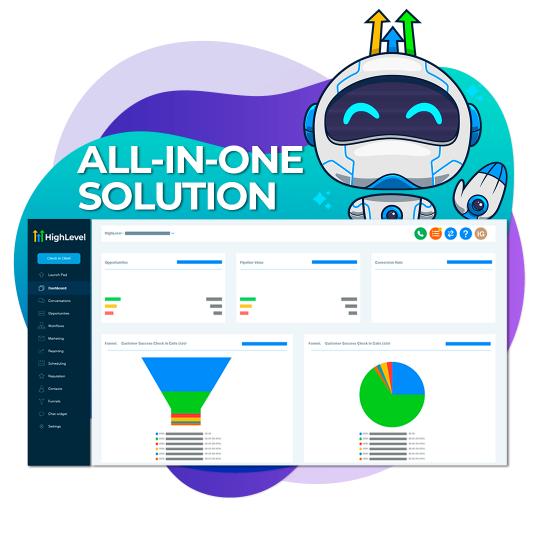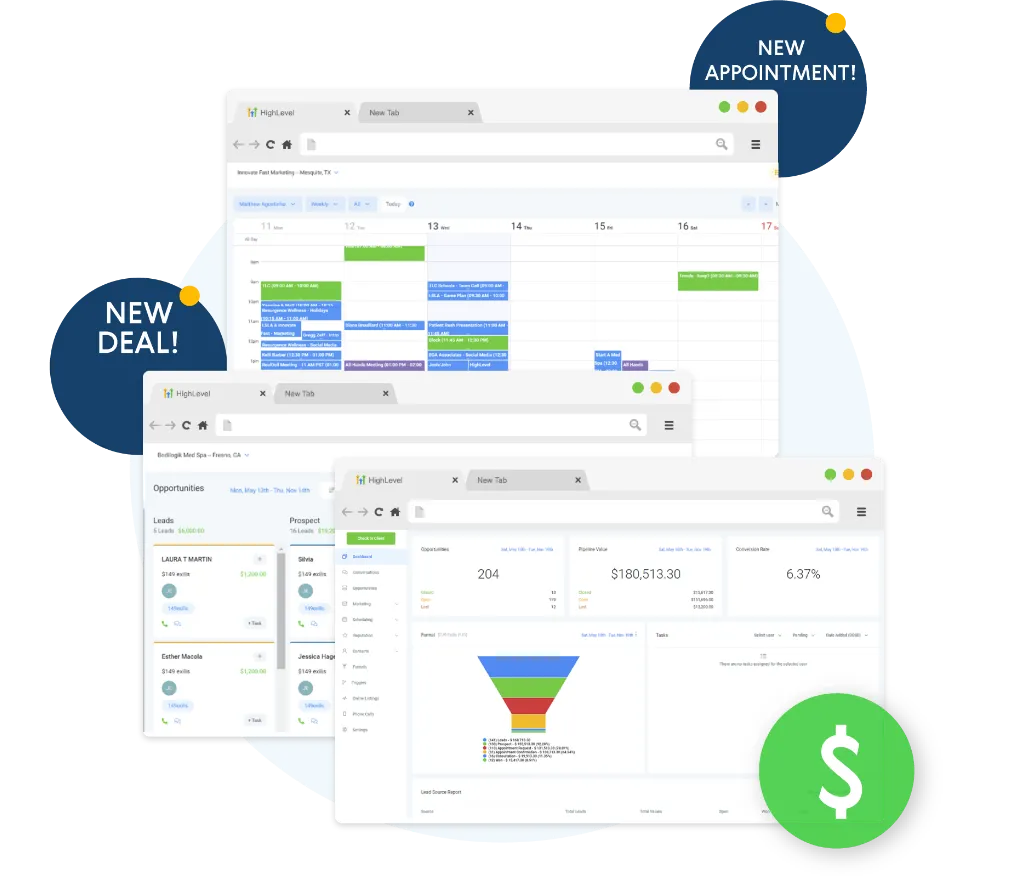Your CRM works best when you care about people's feelings. Being open and honest about how you use customer data helps build trust. When team members talk clearly with each other and show they care, customers feel valued. Big stores like Sephora and Zara do well because they treat each customer as special. Fancy tech tools don't matter as much as being kind and understanding. When you focus on the human side of business, your customers will stick around longer.
Feeling overwhelmed by missed leads and disorganized workflows?
Discover the award-winning platform that automates follow-ups, tracks every lead, and keeps your business running smoothly—all in one place. Thousands of businesses are already transforming their sales and marketing with this trusted solution. Don’t miss out—start your 14-day free trial today and click now to uncover exclusive, limited-time special offers!
The Hidden Cost of Assumptions

Let's talk about hidden costs of CRM systems.
When you buy a CRM system, looking at just the monthly price is a big mistake. Many of us do this, but it can hurt our budgets.
Think about all the extra costs that come with a CRM:
- Moving your old data
- Making changes to fit your needs
- Teaching your team how to use it
- Adding new tools
- Paying for extra users
- Getting special features
To stay safe, make a list of all possible costs before you buy. Talk to the company selling the CRM and ask them about every cost. This way, you won't get any bad surprises later.
Understanding Your Customer Journey First
We need to know how our customers feel at every step. Think about when they first hear about us, buy from us, and need our help later.
Watch closely to see where they get stuck or feel frustrated.
Write down all the places you talk to customers. Look for ways they keep having the same problems. This helps you fix the bad spots and make things better.
Set clear goals to track how well you help customers. Focus on the parts that need the most fixing. This will make your customer system work much better.
Map Every Touchpoint First
Your customers are real people who connect with your business in many ways. Think about all the times they talk to you, buy from you, or use your stuff.
Look at how people find you first. Then see what they do until they buy. Keep watching what they do after they buy too.
Ask your customers what they think. Look at your numbers. Write down every place people meet your business, both online and in person.
Find out where people get stuck or feel mad. These are the spots you need to fix.
Also look for ways to make things better for them.
Track Pain Point Patterns
We need to watch how our customers feel and what bugs them. When we see the same problems pop up, we need to fix them fast.
| Where Problems Come From | What We Look For | How We Help |
|---|---|---|
| What People Tell Us | Comments and calls for help | Make fixes that work |
| Customer's Path | Where people get stuck | Make it smoother |
| System Reports | Big issues that keep coming back | Make things better |
| Looking at Others | What people say about other companies | Fill in what's missing |
Look at what the data tells you. See where people have trouble. Fix the big problems first. Keep an eye on what bugs your customers. Show them you care by fixing things that make them mad.
The more you watch and fix these issues, the happier your customers will be. They will see that you listen and care about making things better for them.
Define Success Metrics Clearly
We need to know if our work with customers is going well. Think of it like keeping score in a game. Watch how people buy from you and help them along the way.
Keep track of simple things, like how many sales you make and how long it takes to make them. Also look at how much each customer spends over time. These numbers tell you if you're doing a good job.
Set clear goals you can reach. Pick the numbers that mean the most to your work. Watch how much it costs to get new customers. See if your customers are happy. Check how fast you fix their problems. Put all these numbers where you can see them easily.
Your customers' needs will change. Look at your numbers often to make sure they still help you grow your business.
Ready to simplify your business operations?
Streamline your workflows and boost productivity with a CRM designed to save you time and effort. From tracking leads to automating follow-ups, this platform does it all. Discover what’s possible—learn more about how it works and see why so many businesses rely on it every day.
Building Trust Through Data Transparency

We want to take good care of your data, just like we take care of you.
When we keep your info correct and up to date, we can serve you better. We tell you what we do with your data and how we keep it safe. This helps you trust us more.
We want to be open with you about how we use your info to help you. This makes us stand out from other companies.
When you know what we do with your data, you feel better about working with us for a long time.
Data Accuracy Builds Credibility
Your CRM needs good data to help people trust it. Think of data like building blocks – when they fit right, you can build something strong. Clean data helps you know your customers better and make smarter choices.
Bad data can come from many places. It's like having puzzle pieces from different boxes. To fix this:
- Check your data often
- Make clear rules about data use
- Show your team how to handle data right
- Keep data the same way in all places
When you take care of your data, your customers will trust you more. Your team will work better too. It's that simple.
Clear Communication Creates Trust
We trust people who tell us the truth about our shared work information.
Your team wants to know what happens with the data they put into the CRM system. Tell them how you collect it and why it helps. Be open about everything you do. This builds trust and makes people feel safe.
When you start using a new CRM system, show your team how it works. Have a meeting to tell them why it matters.
Show them when things will happen. Point out the good things that come from using it. Ask what they think and be there to help when they need it.
Still struggling to keep your business organized?
Take the guesswork out of managing leads and follow-ups with a platform trusted by thousands of businesses. Say goodbye to missed opportunities and hello to a seamless sales process. Act now—try it free for 14 days and discover how easy it is to stay on top of your workflow. Don’t wait—exclusive offers won’t last long!
Cross-Departmental Champions Matter
People working together make CRM tools work better. We need helpers from all teams to make sure everyone uses the new system.
These helpers are like bridges. They connect people and make sure teams talk to each other. When teams work together, good things happen.
| Helper Type | What They Do | How It Helps |
|---|---|---|
| Boss | Leads the way | Makes sure we have what we need |
| Team Leader | Shows how to use it | Gets team to use it |
| Tech Helper | Fixes problems | Keeps it running well |
| Friend in Change | Makes it fun | Helps people like it |
These helpers make the big change easier. They turn hard work into team success.
The Power of Small Wins

We all love to win, even when the wins are tiny steps forward.
Think about when you learn something new in your CRM system – that's a win! When you and your friends at work share these little wins, it makes everyone feel good.
Set small goals you can reach fast. When you hit these goals, tell others about it.
Send a note or talk about it at team meetings. Show people what good things are happening.
The more your team sees these wins, the more they'll want to join in.
Soon, all these small wins add up to make big changes in how your team works together.
Struggling to keep up with your growing business?
Simplify your processes and stay ahead with a CRM that adapts to your needs. Manage leads, automate tasks, and focus on what matters most—growing your business. Take the first step—explore the features today and see how it can transform the way you work.
Beyond Features and Functions
A CRM is more than just fancy tools. It helps you focus on what's most important – your customers. When you treat people well and care about what they need, they stick around longer.
Your team needs to work together smoothly to help customers. When everyone can see customer info right away, they can do a better job.
Think of your CRM as a friend that helps you make customers happy.
The more you know about your customers, the better you can help them. When you make customers feel special, they tell others good things about you.
This turns regular shoppers into people who love your brand.
Emotional Intelligence in CRM

Caring about how customers feel helps us serve them better. When we listen and care, we build real friendships with customers. Companies that care do much better than those that don't.
Why caring matters:
- Teams get better at knowing what customers want
- Customers feel happier when we treat them like real people
- Workers enjoy their jobs more, and customers stay happy too
We win when we treat each person as special. It's not just about numbers – it's about being kind and helpful. The best service comes from really listening and caring about each customer's needs.
Celebrating CRM Success Stories
CRM helps companies connect better with customers.
Let's look at some brands that got it right. Stores like Zara and Tesco talk to their shoppers in ways that make them happy. They care about every time a customer buys from them or asks questions.
Many businesses have grown bigger by using CRM the right way. Think of SiteForce – they made twice as much money as before. Another company, Zimple, grew ten times bigger! They didn't just buy new computer tools. They changed how they work with customers.
Look at Sephora. They give special treats to people who shop with them often. They know what each person likes and sends them deals they'll love.
This makes shoppers come back again and again.
When to Say No

Know when to stop adding new things to your CRM system. Look for signs that show the system is too big.
These signs include:
- The system runs slow
- People get mad when using it
- Fewer people want to use it
When picking CRM partners, watch out for those who:
- Don't share your team's values
- Don't know your type of work well
Being smart about these things helps save money and makes your CRM work better for a long time.
Costly Over-Customization Traps
Your CRM should help your team work better. But too many custom changes can make it break down and cost you lots of money. Many teams want to make their CRM perfect. This can lead to big problems.
You can stay safe from these problems in three ways:
- Know what you want to fix before you start
- Pick changes that work with system updates
- Check if your changes are worth the money, and skip the ones you don't need
The simple changes often work best. When you keep things basic, your system runs better. This saves you time and money in the long run.
System Overload Warning Signs
Your system will let you know when it needs help. It's like a friend who isn't feeling well. When it crashes a lot or moves too slow, it needs care. Your team may find ways around problems or say the system is too hard to use.
Watch out when your data gets messy. You might see the same info twice or find missing parts. Your tools may not work well with each other. If you can't get good reports or help customers fast, stop and take a look at what's wrong.
Many other people have these problems too. The best thing to do is to spot these signs early. Fix them fast so your customers stay happy and your team can work well.
A sick system can hurt your work, so take good care of it.
Wrong Partner Red Flags
Bad CRM Friends: Know the Warning Signs
You need a good friend to help your business grow. But not every CRM company will be your friend. Look for these warning signs before you say yes:
Bad Data Habits
When your contact lists are old or wrong, you can't reach your customers. This hurts your work.
Hard-to-Use Tools
If the system is too hard to use or won't work with your other tools, your team won't want to use it.
No Help When You Need It
A good partner teaches you how to use their tools. They help when you get stuck. If they don't, your team can't do their best work.
Pick a friend who wants you to win. The right CRM should make work easier and help your team do better.
Redefining CRM Implementation Timelines
Getting your CRM up and running takes smart planning. Let's break it down into smaller, easy steps. Think of it like building with blocks – one piece at a time.
We split the work into four main parts:
- Planning: Pick what you want and need
- Setup: Get everything ready to use
- Training: Help people learn the new system
- Launch: Start using it bit by bit
Here's what each part looks like:
Planning
- Pick your goals
- Choose the right tools
- Make sure everyone agrees
Setup
- Put the system together
- Move all your old info over
- Check that everything works
Training
- Show people how to use it
- Write clear how-to guides
- Help everyone learn
Launch
- Start small
- Watch how it's working
- Fix any problems
Take it slow and steady. Make sure to talk to your team often. When people know what's happening, they feel better about using the new system.
Keep checking how things are going and fix issues as they come up.
Remember: small steps lead to big wins.
The Human Element Prevails

Your Team Makes CRM Work
Even the best CRM tools need people to make them work. Your team's feelings and support matter more than fancy features. Success comes when people want to use the system and feel good about it.
Here's how to help your team love using CRM:
- Pick team leaders who can help others learn and stay excited about CRM.
- Give each team the right kind of training that fits their daily work.
- Listen to what your team says and make changes based on their ideas.
Conclusion
Your CRM works best when you care about your customers. Think of it like getting to know a friend. You need to be clear about what you can do. Share good news with your team, even small wins. Treat people like people, not just names in a computer. It's okay to say no when you need to. Take your time to do things right. This helps build trust that lasts.








